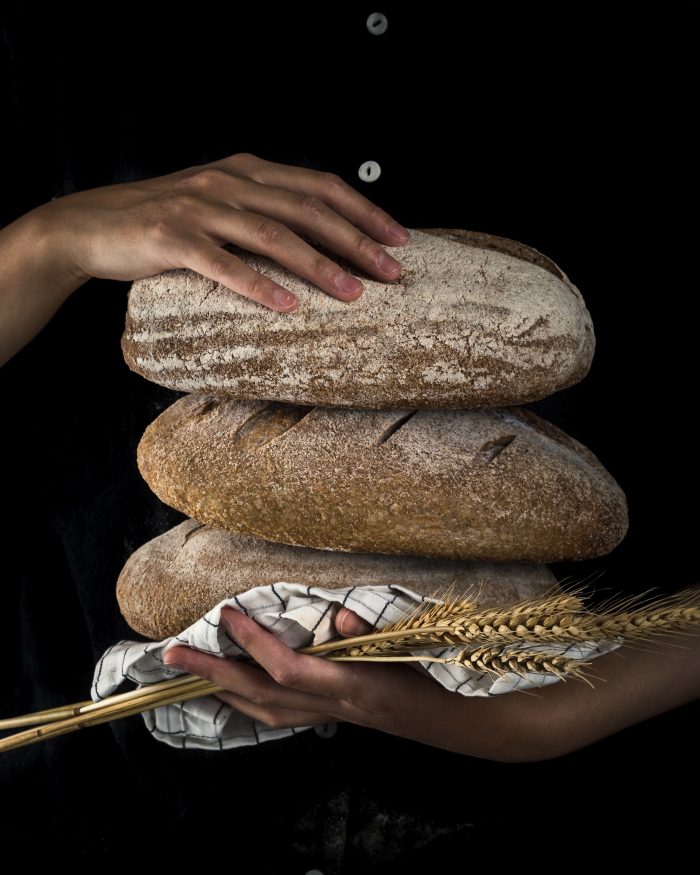You might not often mention fear and bread in the same breath–although fear of a belly bulge prompts many to swear off the doughy, yeasty miracle.
But I would argue that the process of baking bread is a metaphor for how we handle our fears.
Consider that both fear and bread:
- Have several ingredients.
- Under the right circumstances, both will rise with a pungent robustness, then retreat after some kneading.
- Are best handled with care.
- Are difficult to ignore when fresh.
But perhaps the most profound similarity is that both facing fears and baking bread require you to respect the ingredients.
If you combine flour, water and yeast with water that is too hot, you’ll kill the yeast and the concoction won’t rise. Cold water, on the other hand, won’t activate the yeast. If the water temperature is a perfect 120 degrees and your dough rises well but you don’t knead it sufficiently, you end up with a dense, poorly textured log.
Similarly, the components of our fears, whether they’re centered on personal relationships, workplace dynamics, parenting, personal finance or even your creative pursuits (or lack thereof), require respect and reflection.
Here are a few examples:
Relationship Fear: Although you feel like your friendships lack reciprocity—you’re always on the giving end and rarely feel comfortable asserting your wants and needs—you can’t get yourself to show up differently.
Ingredients: Maybe you feel unworthy of asking for attention and have evolved into a people-pleaser to keep the peace in certain friendships. It might be because of how you have been treated in the past or because a significant relationship ended painfully after you asserted yourself. The human brain is constantly predicting and creating stories and can easily forget that the past is not an accurate predictor of the future. Raising awareness around your feelings and behaviors is an important first step in changing both. Otherwise, you risk establishing or enabling the same pattern in other relationships.
Parenting Fear: Your teenage daughter has become surly and non-communicative and you suspect she is struggling with a difficult peer relationship. When you ask her about it, she brushes you off. Frustrated, you have stopped asking for fear that she’ll retreat further.
Ingredients: Maybe your approach could use some tweaking. Instead of asking her what’s wrong—which could put her on the defensive by triggering her own fears—try starting the conversation with a validating comment about a difficult situation you dealt with as a teenager. Hearing your story and sensing empathy might shift the dynamic and make her feel more comfortable sharing.
Money Fear: Your partner/spouse has always handled the household money management and investing, but you’re feeling increasingly uncomfortable with how little you know about it. You fear that by asking for more transparency, he/she could feel a lack of trust or become threatened and defensive.
Ingredients: As a member of the household, it’s important that you have a basic understanding of cash flow and investments–even if you’re not actively engaged in managing them—so that you know what to do if a significant life event (disability, death, separation/divorce) were to occur. If you’re nervous to ask, then you might be taking on what you expect as your partner’s reaction, but that’s not your responsibility. Speaking your concerns and asking for a shift in the flow of information is a reasonable request and one that is in the best interest of the partnership. A negative response from your partner would present an opportunity for deeper discussion and exploration—that might just uncover some of your partner’s fears that deserve attention.
Fear is complicated and can keep us stuck in the dark and doing (or avoiding) the same things over and over. While bread-baking may seem like a wonky comparison, the simple and resonant parallels are tough to ignore. And while embracing the ingredients of our fears may not be as irresistible as a hot boule, it can build bridges to stronger relationships and more courageous choices.
Without a lick of butter.







Read 0 comments and reply